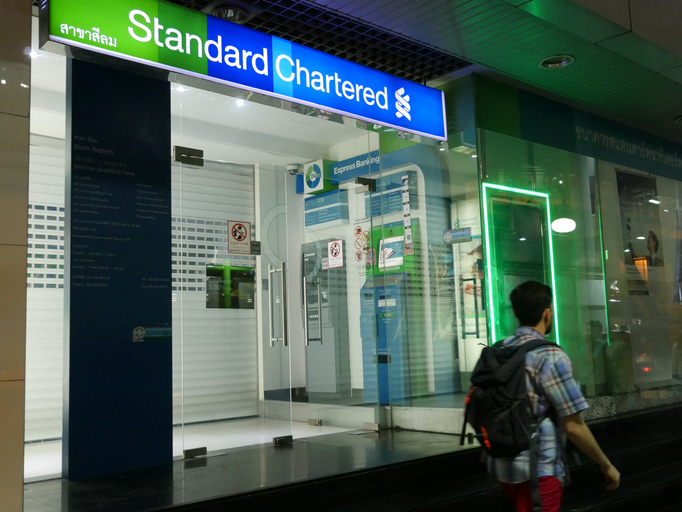ii view: Standard Chartered restarts the interim dividend
Shares for this Asian strong bank have lagged UK rivals since pandemic lows. We assess prospects.
3rd August 2021 15:15
by Keith Bowman from interactive investor
Shares for this Asian strong bank have lagged UK rivals since pandemic lows. We assess prospects.

First-half results to 30 June
- Pre-tax profit before tax up 57% to $2.56 billion
- Interim dividend of 3 US cents per share, down from 7 cents in 2019
- $250 million share buy-back programme
Chief executive Bill Winters said:
"I am encouraged by our positive performance in the first half of 2021 despite an uneven recovery from Covid-19.
“We are more confident in achieving our return on tangible equity targets and we are pleased to announce today an additional share buy-back programme together with the resumption of our interim dividend payment."
ii round-up:
International bank Standard Chartered (LSE:STAN) today reported a robust rebound in profit and an interim dividend of 3 US cents per share as it continued to recover from the worst of the pandemic.
First-half pre-tax profit rose by 57% to $2.56 billion as bad debt provisions fell away and its wealth management business enjoyed a record period. A recommencement of an interim dividend followed its omission during 2020, with shareholder returns further boosted by plans for a $250 million share buyback programme.
Standard shares rose by more than 3% in UK trading, leaving them up by under 10% since pandemic induced market lows back in March 2020. Shares for fellow Asian focused HSBC (LSE:HSBA) are down by just under a fifth over that same time. Shares for UK focused Lloyds Banking Group (LSE:LLOY) are up by just over 50%. Shares for Barclays (LSE:BARC) have more than doubled.
Standard Chartered operates across 59 markets and serves customers in close to 150 markets worldwide. Lagging vaccination rates in many of its emerging market locations and increased geopolitical tensions between China and the West have overshadowed.
Accompanying outlook comments pointed to an uneven and volatile pandemic recovery, although it did flag recently encouraging trends in its bigger markets.
Income across the bank fell by 5% to $7.6 billion and overall expenses rose by 8% to $5.1 billion; partly pushed higher by required investments in digital initiatives.
An improved economic outlook likely contributed to management’s increased confidence in achieving performance goals and implementing a share buyback programme.
ii view:
Headquartered in the UK, Standard Chartered operates across 50 plus countries, primarily in Asia, Africa, the Middle East. Employing more than 80,000 people, its customers and profits are concentrated in the Asia Pacific region. Its services include corporate and institutional banking, private banking, financial markets, and corporate finance. Its strategic priorities are focused on streamlining operations, embracing digitisation, and investing to accelerate growth.
For investors, tensions between the China and the West offer ongoing concern. As does the Covid Delta variant in some of the group’s markets and areas of operation such as India. Work to improve the return on shareholder equity continues. And the headwind of ultra-low interest rates on the differential between deposits and loans looks unlikely to disappear anytime soon.
That said, and like rivals, the very worst of pandemic provisions are hopefully behind it. Shareholder returns have been restarted and strength in the balance sheet remains, with a capital cushion ratio of 14.1%, above management’s target of 13% to 14%. In all, and while work for management remains, signs of recovery at this emerging markets focused bank may now prompt some higher risk investors to begin accumulating holdings.
Positives:
- Pursuing a transformation plan
- Restarted shareholder returns
Negatives:
- Exposure to the politically troubled Hong Kong
- Expenses are rising
The average rating of stock market analysts:
'Buy'
These articles are provided for information purposes only. Occasionally, an opinion about whether to buy or sell a specific investment may be provided by third parties. The content is not intended to be a personal recommendation to buy or sell any financial instrument or product, or to adopt any investment strategy as it is not provided based on an assessment of your investing knowledge and experience, your financial situation or your investment objectives. The value of your investments, and the income derived from them, may go down as well as up. You may not get back all the money that you invest. The investments referred to in this article may not be suitable for all investors, and if in doubt, an investor should seek advice from a qualified investment adviser.
Full performance can be found on the company or index summary page on the interactive investor website. Simply click on the company's or index name highlighted in the article.